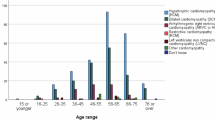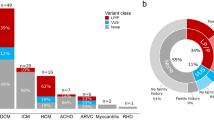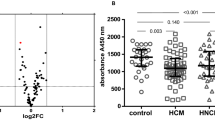Abstract
While debate has focused on whether testing of minors for late onset genetic disorders should be carried out if there is no medical benefit, less is known about the impact on young people (<25 years) who have had predictive testing often many years before the likely onset of symptoms. We looked at the experiences of young people who had had predictive testing for a range of conditions with variable ages at onset and options for screening and treatment. A consecutive series of 61 young people who had a predictive test aged 15–25 years at the Clinical Genetic Service, Manchester, for HD, HBOC (BrCa 1 or 2) or FCM (Hypertrophic Cardiomyopathy or Dilated Cardiomyopathy), were invited to participate. Thirty-six (36/61; 59%) agreed to participate (10 HD, 16 HBOC and 10 FCM) and telephone interviews were audiotaped, transcribed and analysed using Interpretative Phenomenological Analysis. None of the participants expressed regret at having the test at a young age. Participants saw the value of pretest counselling not in facilitating a decision, but rather as a source of information and support. Differences emerged among the three groups in parent/family involvement in the decision to be tested. Parents in FCM families were a strong influence in favour of testing, in HBOC the decision was autonomous but usually congruent with the views of parents, whereas in HD the decision was autonomous and sometimes went against the opinions of parents/grandparents. Participants from all three groups proposed more tailoring of predictive test counselling to the needs of young people.
Similar content being viewed by others
Log in or create a free account to read this content
Gain free access to this article, as well as selected content from this journal and more on nature.com
or
References
Semaka A, Creighton S, Warby S, Hayden MR : Predictive testing for Huntington disease: interpretation and significance of intermediate alleles. Clin Genet 2006; 70: 283–294.
Maron BJ, Maron MS, Semsarian C : Genetics of hypertrophic cardiomyopathy after 20 years: clinical perspectives. J Am Coll Cardiol 2012; 21: 705–715.
Meric-Bernstam F, Gutierrez-Barrera AM, Litton J et al: Genotype in BRCA-associated breast cancers. Breast J 2013; 19: 87–91.
European Society of Human Genetics: Genetic testing in asymptomatic minors: recommendations of the European Society of Human Genetics. Eur J Hum Genet 2009; 17: 720–721.
Broadstock M, Michie S, Marteau T : Psychological consequences of predictive genetic testing: a systematic review. Eur J Hum Genet 2000; 8: 731–738.
Decruyenaere M, Evers-Kiebooms G, Cloostermans T et al: Psychological distress in the 5-year period after predictive testing for Huntington’s disease. Eur J Hum Genet 2003; 11: 30–38.
Meiser B : ‘Psychological impact of genetic testing for cancer susceptibility: an update of the literature’. Psych Onc 2005; 14: 1060–1074.
Gargiulo M, Lejeune S, Tanguy M-L et al: Long-term outcome of presymptomatic testing in Huntington disease. Eur J Hum Genet 2009; 17: 165–171.
Timman R, Roos R, Maat-Kievit A, Tibben A : Adverse effects of predictive testing for Huntington disease underestimated: long term effects 7-10 years after the test. Health Psychol 2004; 17: 165–171.
Sobel SK, Cowan DB : Impact of genetic testing for Huntington disease on the family system. Am J Med Genet 2000; 90: 49–59.
Nycum G, Avard D, Knoppers BM : Factors influencing intrafamilial communication of hereditary breast and ovarian cancer genetic information. Eur J Hum Genet 2009; 17: 872–880.
Bombard Y, Palin J, Friedman JM et alCanadian respond-HD collaborative research group: Factors associated with experiences of genetic discrimination among individuals at risk for Huntington disease. Am J Med Genet B Neuropsychiatr Genet 2011; 156B: 19–27.
Duncan RE, Gillam L, Savulescu J et al: “You’re one of us now”: Young people describe their experiences of predictive genetic testing for Huntington disease (HD) and familial adenomatous polyposis (FAP). Am J Med Genet (Semin Med Genet) 2008; 148C: 47–55.
Duncan RE, Gillam L, Savulescu J, Williamson R, Rogers JG, Delatycki MB : The challenge of developmentally appropriate care: predictive genetic testing in young people for familial adenomatous polyposis. Fam Cancer 2010; 9: 27–35.
Werner-Lin A, Hoskins LM, Doyle MH, Greene MH : Werner-Lin. ‘Cancer doesn’t have an age’: genetic testing and cancer risk management in BRCA1/2 mutation-positive women aged 18-24. Health 2012; 16: 636–654.
Hoskins LM, Roy KM, Greene MH : Toward a new understanding of risk perception among young female BRCA1/2 ‘previvors’. Families, Systems & Health 2012; 30: 32–46.
Meulenkamp TM, Tibben A, Mollema ED et al: Predictive genetic testing for cardiovascular diseases: impact on carrier children. Am J Med Genet 2008; 146A: 3136–3146.
MacLeod R, Tibben A, Frontali M et al: Recommendations for the predictive genetic test in Huntington’s Disease. Clin Genet 2013; 83: 221–223.
Smith JA, Osborn M : Interpretative Phenomenological Analysis; In Smith JA (ed): Qualitative Psychology: A Practical Guide to Methods. London: Sage 2nd (edn) 2008.
Smith JA, Jarman M, Osborne M : Doing Interpretative Phenomenological Analysis; In Murray M, Chamberlain K (eds): Qualitative Health Psychology: Theories and Methods. London: Sage, 1999, pp l218–l240.
Wilson K, Roe B, Wright L : Telephone or face-to-face interviews? a decision made on the basis of a pilot study. Int J of Nurs Stud 1998; 35: 314–321.
Carr ECG, Worth A : The use of the telephone interview for research. Nurs Times Res 2001; 6: 511–524.
Wright C, Kerzin-Storrar L, Williamson PR et al: Comparison of genetic services with and without genetic registers: knowledge, adjustment and attitudes about genetic counselling among probands referred to three genetic clinics. J Med Genet 2002; 39: e84.
Kerzin-Storrar L, Wright C, Williamson PR et al: Comparison of genetic services with and without genetic registers: access and attitudes to genetic counselling services among relatives of genetics clinic patients. J Med Genet 2002; 39: e85.
Wilding A, Ingham SL, Lalloo F : Life expectancy in hereditary cancer predisposing diseases: an observational study. J Med Genet 2012; 49: 264–269.
Hamilton R : Being young, female, and BRCA positive. Am J Nurs 2012; 112: 26–31.
Acknowledgements
We thank the young adults who participated in the study and generously shared their experiences of predictive testing, and colleagues in the Clinical Genetic Service in Genetic Medicine, St Mary’s Hospital for help with ascertainment.
Author information
Authors and Affiliations
Corresponding author
Ethics declarations
Competing interests
The authors declare no conflict of interest.
Rights and permissions
About this article
Cite this article
MacLeod, R., Beach, A., Henriques, S. et al. Experiences of predictive testing in young people at risk of Huntington’s disease, familial cardiomyopathy or hereditary breast and ovarian cancer. Eur J Hum Genet 22, 396–401 (2014). https://doi.org/10.1038/ejhg.2013.143
Received:
Revised:
Accepted:
Published:
Issue date:
DOI: https://doi.org/10.1038/ejhg.2013.143
Keywords
This article is cited by
-
Acceptability of predictive testing for ischemic heart disease in those with a family history and the impact of results on behavioural intention and behaviour change: a systematic review
BMC Public Health (2022)
-
Examining the uptake of predictive BRCA testing in the UK; findings and implications
European Journal of Human Genetics (2021)
-
Genetic counselling as a route to enhanced autonomy: using a sequential mixed methods research approach to develop a theory regarding presymptomatic genetic testing for young adults at risk of inherited cancer syndromes
Journal of Community Genetics (2021)
-
A framework for youth-friendly genetic counseling
Journal of Community Genetics (2020)
-
Ethics in genetic counselling
Journal of Community Genetics (2019)



